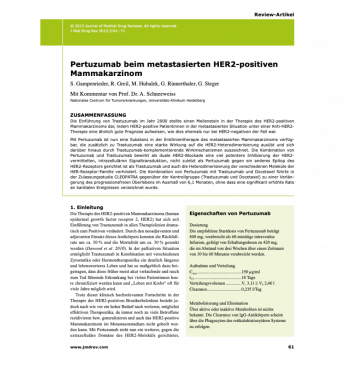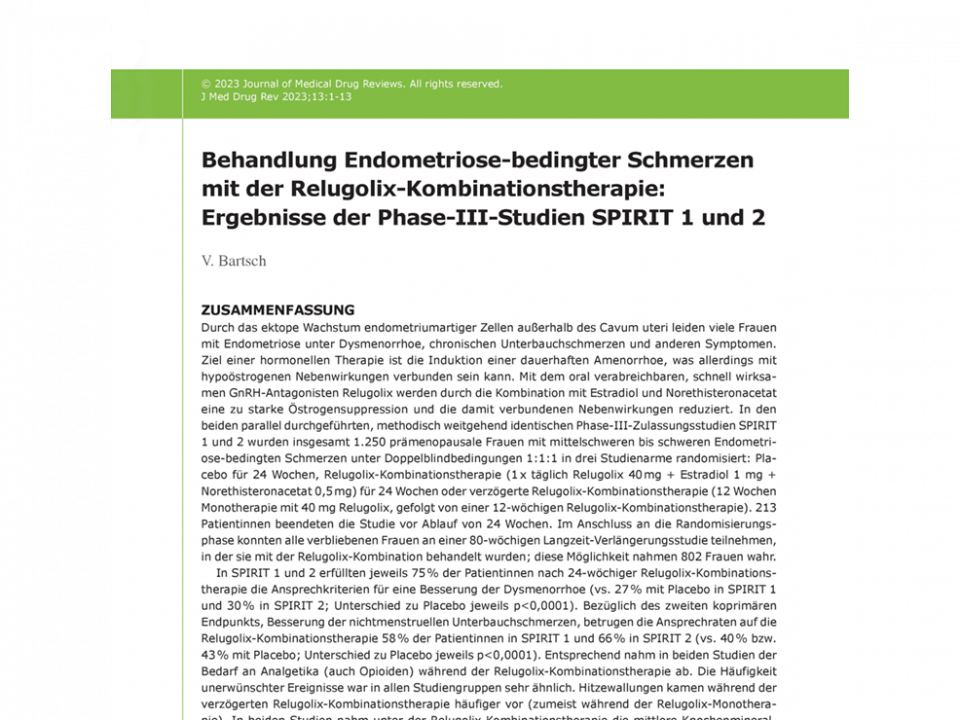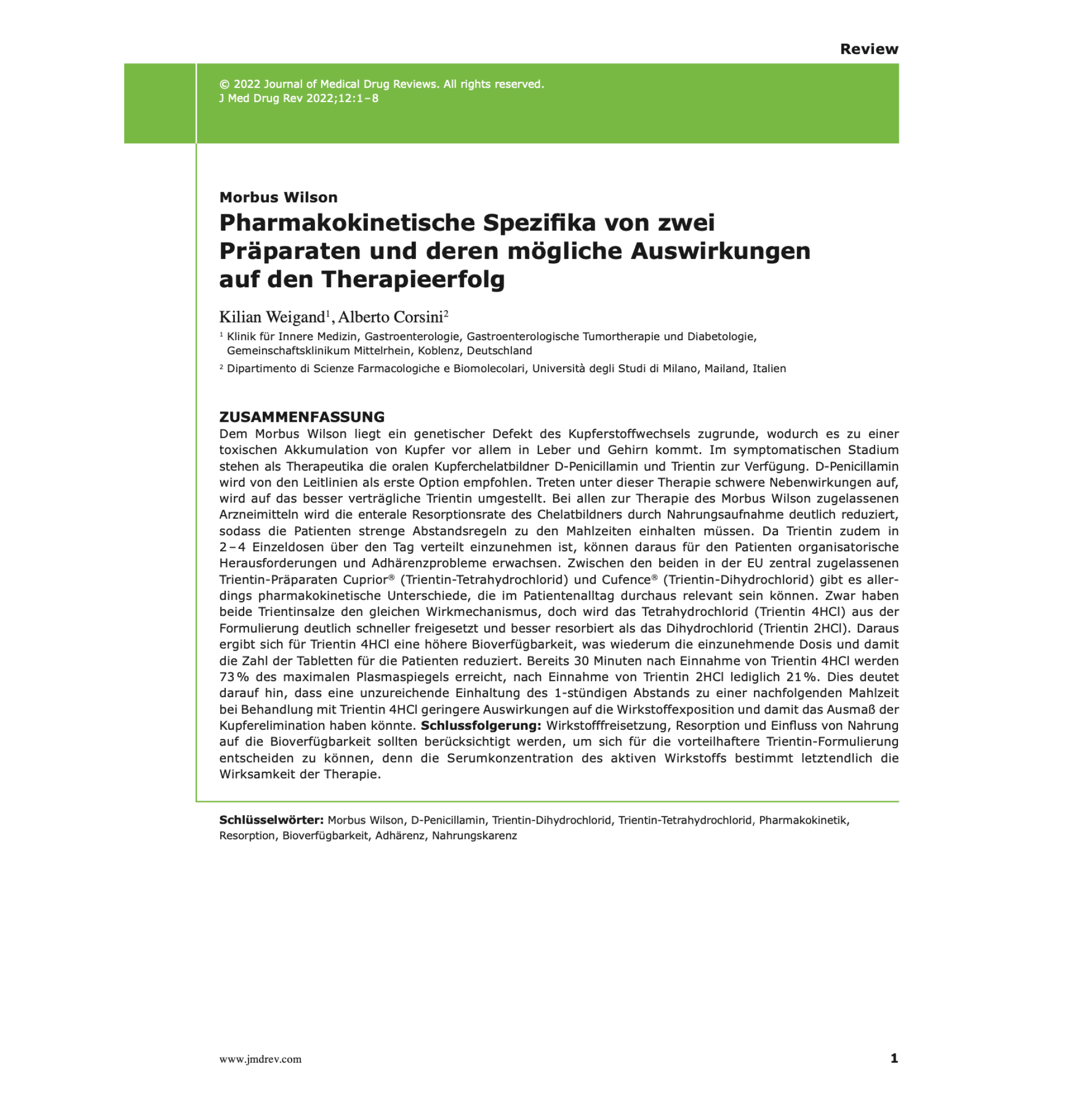Pertuzumab beim metastasierten HER2-positiven Mammakarzinom
J Med Drug Rev 2013;3:61–71
Die Einführung von Trastuzumab im Jahr 2000 stellte einen Meilenstein in der Therapie des HER2-positiven Mammakarzinoms dar, indem HER2-positive Patientinnen in der metastasierten Situation unter einer Anti-HER2- Therapie eine ähnlich gute Prognose aufweisen, wie dies ehemals nur bei HER2-negativen der Fall war.
Mit Pertuzumab ist nun eine Substanz in der Erstlinientherapie des metastasierten Mammakarzinoms verfügbar, die zusätzlich zu Trastuzumab eine starke Wirkung auf die HER2-Heterodimerisierung ausübt und sich darüber hinaus durch Trastuzumab-komplementierende Wirkmechanismen auszeichnet. Die Kombination von Pertuzumab und Trastuzumab bewirkt als duale HER2-Blockade eine viel potentere Inhibierung der HER2- vermittelten, intrazellulären Signaltransduktion, nicht zuletzt als Pertuzumab gegen ein anderes Epitop des HER2-Rezeptors gerichtet ist als Trastuzumab und auch die Heterodimerisierung der verschiedenen Moleküle der HER-Rezeptor-Familie verhindert. Die Kombination von Pertuzumab mit Trastuzumab und Docetaxel führte in der Zulassungsstudie CLEOPATRA gegenüber der Kontrollgruppe (Trastuzumab und Docetaxel) zu einer Verlängerung des progressionsfreien Überlebens im Ausmaß von 6,1 Monaten, ohne dass eine signifikant erhöhte Rate an kardialen Ereignissen verzeichnet wurde.
Pertuzumab for the Treatment of HER2-Positive Metastatic Breast Cancer
ABSTRACT
The introduction of trastuzumab in the year 2000 has marked a major milestone in the treatment of HER2-positive breast cancer. HER2-positive breast cancer patients with metastatic propertiesreceiving trastuzumab therapy obtain a prognosis which iscomparably good as that of women with HER2-negative breast cancer.
With pertuzumab, a compound,which along with trastuzumab strongly inhibits HER2 heterodimerization,is now available for first-line therapy of metastatic breast cancer. Moreover, its mechanisms of actionare complementary to those of trastuzumab. Combining pertuzumab and trastuzumab as a dual blockade strategy to antagonize HER2 leads to a far more potent inhibition of HER2-mediated intracellular signalling pathways, especially because pertuzumab is directed against a different epitope of the HER2 receptor than trastuzumab.Furthermore, heterodimerization of various members of the HER2 receptor family is also inhibited. In the pivotal registration trial CLEOPATRA, the combination of pertuzumab with trastuzumab and docetaxel led to a prolongation of progression-free survival by about 6.1 monthsversus the control group (trastuzumab and docetaxel) without any significant increase in the incidence of adverse cardiac effects.
Die Einführung von Trastuzumab im Jahr 2000 stellte einen Meilenstein in der Therapie des HER2-positiven Mammakarzinoms dar, indem HER2-positive Patientinnen in der metastasierten Situation unter einer Anti-HER2- Therapie eine ähnlich gute Prognose aufweisen, wie dies ehemals nur bei HER2-negativen der Fall war.
Mit Pertuzumab ist nun eine Substanz in der Erstlinientherapie des metastasierten Mammakarzinoms verfügbar, die zusätzlich zu Trastuzumab eine starke Wirkung auf die HER2-Heterodimerisierung ausübt und sich darüber hinaus durch Trastuzumab-komplementierende Wirkmechanismen auszeichnet. Die Kombination von Pertuzumab und Trastuzumab bewirkt als duale HER2-Blockade eine viel potentere Inhibierung der HER2- vermittelten, intrazellulären Signaltransduktion, nicht zuletzt als Pertuzumab gegen ein anderes Epitop des HER2-Rezeptors gerichtet ist als Trastuzumab und auch die Heterodimerisierung der verschiedenen Moleküle der HER-Rezeptor-Familie verhindert. Die Kombination von Pertuzumab mit Trastuzumab und Docetaxel führte in der Zulassungsstudie CLEOPATRA gegenüber der Kontrollgruppe (Trastuzumab und Docetaxel) zu einer Verlängerung des progressionsfreien Überlebens im Ausmaß von 6,1 Monaten, ohne dass eine signifikant erhöhte Rate an kardialen Ereignissen verzeichnet wurde.
Pertuzumab for the Treatment of HER2-Positive Metastatic Breast Cancer
ABSTRACT
The introduction of trastuzumab in the year 2000 has marked a major milestone in the treatment of HER2-positive breast cancer. HER2-positive breast cancer patients with metastatic propertiesreceiving trastuzumab therapy obtain a prognosis which iscomparably good as that of women with HER2-negative breast cancer.
With pertuzumab, a compound,which along with trastuzumab strongly inhibits HER2 heterodimerization,is now available for first-line therapy of metastatic breast cancer. Moreover, its mechanisms of actionare complementary to those of trastuzumab. Combining pertuzumab and trastuzumab as a dual blockade strategy to antagonize HER2 leads to a far more potent inhibition of HER2-mediated intracellular signalling pathways, especially because pertuzumab is directed against a different epitope of the HER2 receptor than trastuzumab.Furthermore, heterodimerization of various members of the HER2 receptor family is also inhibited. In the pivotal registration trial CLEOPATRA, the combination of pertuzumab with trastuzumab and docetaxel led to a prolongation of progression-free survival by about 6.1 monthsversus the control group (trastuzumab and docetaxel) without any significant increase in the incidence of adverse cardiac effects.




